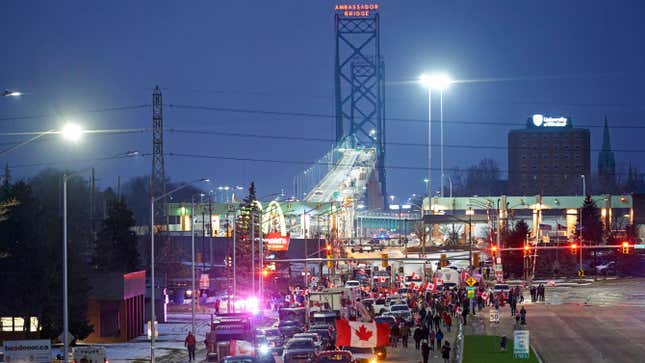
Two Ford Motor Company facilities in Canada are already being affected by the shutdown of the Ambassador Bridge, now in its third day. The protest, mostly of pickup trucks, has left the busiest border crossing in North America with only one lane going towards the U.S. and none coming into Canada.
Ford closed its engine plant in Windsor while the Oakville, Ontario plant, where Ford builds the Ford Edge and Lincoln Nautilus, will run on a reduced schedule, ABC reports. And Ford isn’t the only automaker feeling the pinch:
Shortages due to the blockade also forced General Motors to cancel the second shift of the day at its midsize-SUV factory near Lansing, Michigan. Spokesman Dan Flores said it was expected to restart Thursday and no additional impact was expected for the time being.
Later Wednesday, Toyota spokesman Scott Vazin said the company will not be able to manufacture anything at three Canadian plants for the rest of this week due to parts shortages. A statement attributed the problem to supply chain, weather and pandemic-related challenges, but the shutdowns came just days after the blockade began Monday.
“Our teams are working diligently to minimize the impact on production,” the company said, adding that it doesn’t expect any layoffs at this time.
Stellantis, formerly Fiat Chrysler, reported normal operations, though the company had to cut shifts short the previous day at its Windsor minivan plant.
Remember last year when it was a goofy giant ship stuck in a canal that was messing up global trade? Good times.
The White House is coordinating closely with major automotive manufacturers, Customs and Border Protection officials, and Michigan Governor Gretchen Whitmer, according to White House Press Secretary Jen Psaki.
“The President is focused on this and we are working very closely with the team at DHS, with Canadian officials and others to do everything we can to alleviate the impact,” Psaki said.
The Ambassador bridge connects Detroit to Windsor, Ontario carries over 25 percent of all trade between the U.S. and Canada. An estimated $500 million in goods are trucked back and forth on the bridge everyday. About 50 to 60 pickup trucks and 100 protesters have the bridge shut down on the Windsor side. The closest crossing to the Ambassador is the Blue Water Bridge in Port Huron, Michigan, which tacks 4 and a half hours to truckers travel time.
Supply chain problems have already dragged on auto manufacturing since the start of the pandemic, especially the worldwide chip shortage and backed-up shipping ports. The shortage of new cars and trucks and a booming economy has caused the price of a new vehicle to surge to an all time high of $47,077.